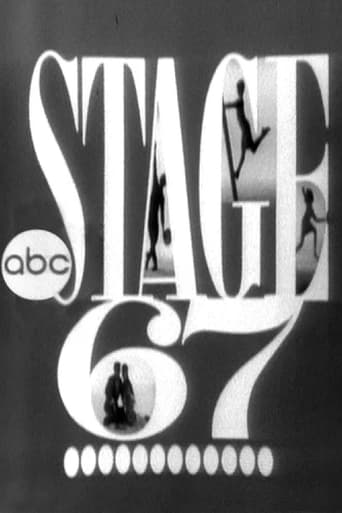F Gwynplaine MacIntyre
The number in the title 'ABC Stage 67' referred to the one and only year in which this series aired: the 1966/67 TV season. If it had run longer, would they have upped the number every year? (This was done for the children's TV series "Discovery '62", which became "Discovery '63" in its second season.) UPDATE: My thanks to correspondent J. Posner, who points out to me that ABC's Manhattan studio is located in West 67th Street; this is likely the real explanation for the title 'Stage 67'.At all events, 'ABC Stage 67' was an ambitious attempt to repeat the success of the 'Omnibus' TV series a decade previously ... offering a mixed fare of music, comedy, drama, and documentary. Regrettably, 'ABC Stage 67' transmitted only 26 episodes from September '66 through May of the next year. One other episode was produced but never aired: 'Eat the Document', a hodgepodge of rock-concert footage featuring Bob Dylan, John Lennon and Johnny Cash.This posting is a review of the 12 October 1966 episode of 'ABC Stage 67', an original musical comedy (in colour) called 'Olympus 7-000', with music and lyrics by Richard Adler ... chiefly of interest for a brief appearance by Joe Namath and the New York Jets.The songwriting team Richard Adler and Jerry Ross wrote the excellent score for "John Murray Anderson's Almanac", a 1953 Broadway revue that really ought to be revived. More famously, they wrote the songs for two Broadway musicals that have been classics ever since: 'The Pyjama Game' and 'Damn Yankees'. Most songwriting teams consist of a composer and a lyricist, but Adler and Ross co-wrote their tunes and their lyrics. They were proteges of the great songwriter Frank Loesser, who likewise wrote music and lyrics. Jerry Ross died of leukaemia before his 30th birthday, leaving us to wonder what great shows this talented team might have written. Richard Adler has continued to write new material, but he has never recaptured the early success of his teamwork with Ross.The script of 'Olympus 7-000' was by Broadway veteran Jerome Chodorov, who had earned success with 'My Sister Eileen' and other projects ... but his story for 'Olympus 7-000' was terrible, and derivative with it.You can almost smell the desperation of this project, and I suspect that most of the blame should go to Richard Adler. His most successful project had been 'Damn Yankees', a musical comedy in which the Devil comes to Earth to help the world's worst baseball team win the pennant. 'Olympus 7-000' is a blatant reworking of the same premise: this time, God comes to Earth to help the world's worst football team win the championship. But some viewers might get perturbed if the Lord God Jehovah got involved in such mundane activities. So, instead of the Judaeo-Christian deity, we have the Greek god Hermes showing up in New England to help a college football squad in the present day (1966).Straight from the kick-off, this raises some unpleasant questions: if the Greek gods are real, where have they been hiding all these centuries? And if Hermes (or any other god) is willing to give supernatural assistance to a football team, then why doesn't he lend a hand to all the people dying in earthquakes, famines, and so forth? Maybe I shouldn't inject these big metaphysical questions into a frothy little musical comedy, but 'Olympus 7-000' is such a plodding lump of work that I had plenty of time to ponder such issues while I watched this old kinescope.The god Hermes is played by Donald O'Connor, looking not so much godlike as elfin. As Hermes, O'Connor wears a metallic silver-coloured outfit and a shiny bowler hat with wings on the brim. In this glittering ensemble, O'Connor looks like the mutant offspring of a one-night stand between the Tin Woodman of Oz and Og the Leprechaun from "Finian's Rainbow". O'Connor brandishes a little silvery stick which is apparently meant to be the caduceus of Hermes, but it looks more like Glinda's fairy wand. And, yes, 'Olympus 7-000' is Hermes's phone number.Veteran comedian Eddie Foy, Jnr struggles gamely in his role as Casey, the coach of the hapless football team. Character actor Fred Clark (whom I always enjoy watching) is deliciously dyspeptic in a badly-written role as the dean of the college. Phyllis Newman is quite attractive as the dean's daughter, although I can do without her singing. The underrated Larry Blyden provides the love interest for Ms Newman, and vulgar comedian Lou Jacobi leers and smirks on the sidelines.The most interesting bit of casting in 'Olympus 7-000' is also the only reason why this poor musical (only an hour long, with commercials) is ever likely to be made available on video. The quarterback of the incompetent football team is played by none other than Joe Namath, who was probably at the peak of his popularity at this time. Namath demonstrated some minor talent elsewhere (not here) as an actor. Namath eventually starred as Joe Hardy in a dinner-theatre production of 'Damn Yankees' ... a role similar to the one he plays here, but in a much better show.The best songs in 'Olympus 7-000' are 'Better Things to Do' (a duet for O'Connor and Newman) and Eddie Foy's number 'The Three of Us' ... but 'best' is hardly the proper word here. This terrible show was directed by Stanley Prager (who?), and the musical numbers were staged by Gordon Rigsby (huh?). If you're a fan of any of the performers in this show (including Joe Namath), be assured that all of them did much better work elsewhere. 'Olympus 7-000' is hardly the stuff of the gods, although I might consider it a Greek tragedy.
